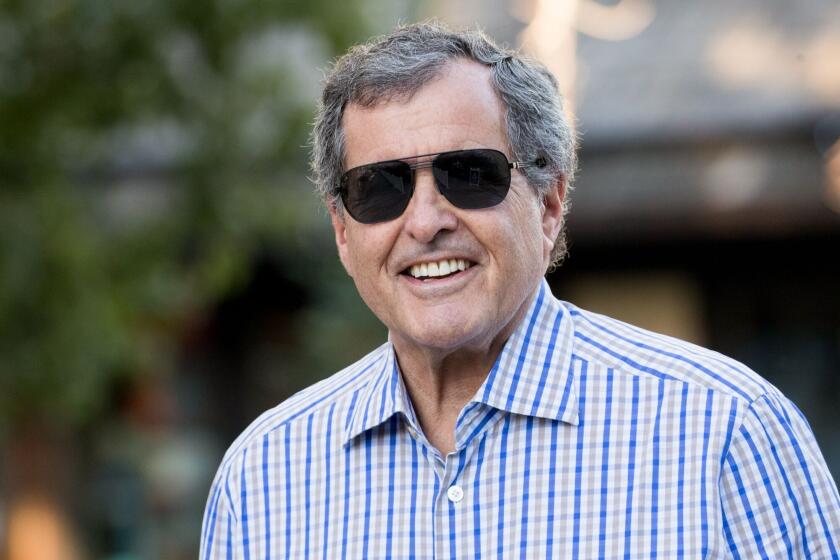SEC Held Ready to Charge Drexel, Milken With Fraud
- Share via
NEW YORK — The Securities and Exchange Commission has voted to authorize the filing of securities fraud charges against Drexel Burnham Lambert Inc. and its controversial Beverly Hills junk bond financier, Michael Milken, sources said Tuesday.
The SEC’s decision, which sources said was made recently at a closed meeting, means the agency’s commissioners, after reviewing a nearly two-year investigation by its enforcement staff, have decided there is sufficient evidence to file a civil lawsuit against Drexel, Milken and other Drexel executives.
The SEC’s long-running investigation of Drexel, which is one of the largest and most profitable investment firms on Wall Street, was sparked by information provided by jailed stock speculator Ivan F. Boesky, who pleaded guilty to securities fraud in April, 1987. The probe has ranged beyond Boesky’s allegations, however, and has involved information provided by other cooperating witnesses, sources said.
The SEC lawsuit is not expected to be lodged against Drexel immediately, sources said. They said the agency would likely hold off filing because it does not want to interfere with a parallel criminal probe of Drexel being conducted here by U.S. Atty. Rudolph W. Giuliani.
After being informed earlier this year that the SEC enforcement staff would recommend charges, Drexel attorneys submitted a document, known as a “Wells submission,” arguing that the charges had no merit.
“At the time we filed our Wells submission in response to the staff’s recommendations to the commission, we told them we view their position as wrong,” Steven Anreder, a spokesman for both Drexel and Milken, said Tuesday. “Our position was based on our thorough analysis of the 1.5 million pages of documentation we had supplied, and on the simple fact that the principal source of the charges is Ivan Boesky, a convicted felon and admitted liar. That remains our view Tuesday.” Anreder declined further comment.
SEC enforcement chief Gary Lynch declined comment, as did officials at the Manhattan U.S. attorney’s office.
The SEC’s action was described by sources as partly an attempt to prod the U.S. attorney’s office toward completing its criminal investigation. The SEC, the sources said, has been ready to proceed against Drexel and Milken for some time, but the U.S. attorney’s office has taken longer to complete its criminal probe. A criminal case involves a more exacting standard of proof than a civil lawsuit. No charges have been filed in the criminal investigation.
Not Before October
It is not clear how long the SEC might be willing to hold off filing civil charges while the U.S. attorney’s office completes its criminal probe. Drexel executives have been told that the firm does not expect any criminal charges, if they are eventually brought, to be filed before October, sources have said.
From Drexel’s Beverly Hills office, Milken, one of the nation’s most controversial and influential financiers, oversees a multibillion-dollar junk bond operation that has played a major role in reshaping the U.S. business landscape through corporate takeovers and innovative financing techniques.
Since November, 1986, however, Milken and Drexel have been the subjects of extensive negative publicity stemming from the twin federal probes. That month, the investigations were disclosed when Boesky paid the SEC a record $100 million to settle civil charges that he traded stocks on the basis of illegal insider information provided by former Drexel investment banker Dennis B. Levine. Boesky pledged to cooperate with government investigators against Drexel.
Both Boesky and Levine are serving sentences in minimum-security federal prisons.
Stock-Trading Plan
Boesky has told investigators that he was involved in an illegal stock-trading arrangement with Milken to facilitate corporate takeovers and other transactions, sources have said.
Boesky has told investigators that the arrangement, which involved maintenance of false books and records, was reconciled by a $5.3-million payment he made to Drexel in March, 1986. Drexel has said the payment was made in exchange for legitimate financial advisory services that the firm performed for Boesky.
While declining to be more specific, sources added that any SEC charges against Drexel and some of its executives would not be limited to Boesky’s allegations.
The SEC’s decision to authorize a civil lawsuit against Drexel but postpone its immediate filing reflects a balancing of arguments about whether the commission would benefit from moving quickly, sources said.
Could Get Evidence
If the SEC files its case long before the U.S. attorney acts, it risks permitting Drexel, under the rules governing civil lawsuits, to gather extensive evidence about how the government’s investigation was put together.
If the criminal investigation results in charges and the civil suit has already been filed, Drexel might be able to obtain testimony from witnesses in the SEC case, such as Boesky, who would be expected to play an important role at any criminal trial.
Moreover, by moving before the U.S. attorney, the SEC risks bolstering a possible Drexel criminal defense--namely, that the firm has been subjected to unfair pretrial publicity.
One factor at work in the SEC’s decision, sources said, is the desire by both the SEC and the U.S. attorney’s office to receive what each believes to be its proper share of credit for the Drexel probe. Some tension has developed over attempts to coordinate the timing of their possible respective cases.
More to Read
Inside the business of entertainment
The Wide Shot brings you news, analysis and insights on everything from streaming wars to production — and what it all means for the future.
You may occasionally receive promotional content from the Los Angeles Times.










